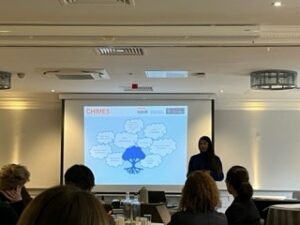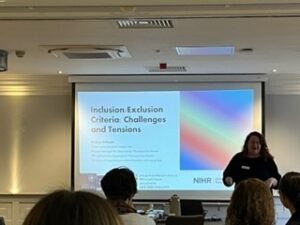
Recently, the OH BRC held a Joint Equality Diversity and Inclusion (EDI) & Patient and Public Involvement Engagement and Participation (PPIEP) workshop in Oxford to discuss barriers to research participation, including any unintended consequences, driven by study inclusion & exclusion criteria, and ways to overcome them.
The Workshop participants heard from a number of speakers, including:
- Dr Amy Gillespie, Senior Post-doctoral Researcher & Project Manager for Oxford Health BRC Depression Therapeutics Theme.
- University of Oxford Professor Mahendra Patel, Director of Centre for Research Equity.
- Mohamed Patel, Equality & Diversity Lead, Oxford Health NHS Foundation Trust
- Dr Thomas Kabir, Senior Researcher, Departments of Experimental Psychology & Psychiatry, University of Oxford (contributing to the Psychological Treatments Theme)
- Niyah Campbell, Birmingham Youth Group, Senior Patient and Public Involvement and Engagement Lead.
- Dr Roisin Mooney, Post-Doctoral Researcher and Project Manager, CHiMES Team, University of Oxford (contributing to the Mental Health in Development and Prevention of Multiple Morbidities Themes).
As well as listening to presentations, the attendees took part in interactive sessions that considered the nine protected characteristics* that forms part of diversity data and how these may impact on research participation, including information on legislation surrounding these characteristics. We aimed to identify challenges or barriers that we might be able to address to increase research participation.
At the conclusion of the workshop, a list of priority areas to address in work with our BRC partners, and other key stakeholders was identified. We aim to encourage further discussion of the issues raised through our involvement in groups that work across all 20 BRCs.
Feedback on the day was positive, Oxford Health BRC Strategic Partnerships Manager and event organiser Dr Pamela Reid said,
“We brought together the major research groups involved in our BRC Themes, including at our partners, to address inclusive research and exclusion criteria as part of our EDI and PPIEP Strategies. We were treated to excellent presentations with case studies where the focus is on increasing research participation and reducing barriers and unintended consequences. We discussed the nine protected characteristics that form part of diversity data collection and how these aid or hinder research participation. At the end of a really interesting workshop, we prioritised areas we could focus on, and committed to work with our partner organisations to address these together.”
Delegate Andreea Raslescu, DPhil student, Psychopharmacology and Emotion Lab University of Oxford commented:
“I signed up to the workshop to gain a broader understanding of how we, as researchers, may inadvertently contribute to a lack of diversity in our samples through the setting of strict inclusion and exclusion criteria for studies. As I transition from a DPhil to more senior roles within research, I want to ensure inclusivity is built into every step of my work; it was fantastic being in a room full of people who share the same vision. One of the most important take-home messages from the day was to prioritise patient involvement from the earliest stages of selecting those criteria. It has also become apparent that this is an issue we can only tackle together as a research community, at all stages within the lifecycle of a project, from receiving initial funding through to publishing our findings.”
You can read more on this important topic from presenter on the day, Dr Roisin Mooney, who wrote a blog for the University of Oxford Department of Psychiatry “Reflections on conducting inclusive, participatory research in NHS settings”
*Protected Characteristics
- Age
- Disability
- Gender reassignment
- Marriage and civil partnership
- Pregnancy and maternity
- Race
- Religion or belief
- Sex
- Sexual orientation
Socioeconomic status (added by the NIHR from April 2023)





